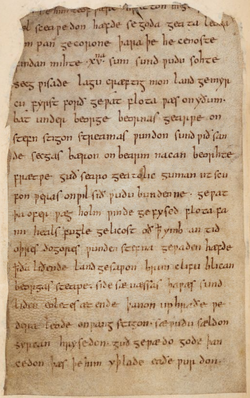Portal:Old English literature
This portal will direct you to works in Old English.
Poetry
[edit]
The four poetic codices
[edit]Almost all surviving Anglo-Saxon poems are preserved in four main manuscripts. Poems are thus listed by manuscript.
The Nowell Codex contains both prose and poetry, with a supposed theme of monstrosity and the exotic.
- Beowulf, a tale of the life and deeds of the eponymous monster-slayer
- Judith, the story of Judith of Bethulia's beheading of Assyrian general Holofernes
The Junius Manuscript contains reworkings of three Books of the Old Testament into Old English epic poetry, as well as Christ and Satan, which inspires rather from the New Testament.
The Vercelli Book is a compendium of poems and homilies found in Vercelli, Italy. It was perhaps left there by an Anglo-Saxon pilgrim on his way to Rome.
- Andreas, the story of Saint Andrew's rescue of Saint Matthew from a city of cannibals
- The Fates of the Apostles, by Cynewulf, a mnemonic for remembering what happened to the Apostles after the Ascension
- Soul and Body I, a dialogue between the soul and the body
- The Dream of the Rood, the crucifix gives a first-person account of Christ's crucifixion
- Elene, an account of Saint Helena's journey to find the True Cross
- Homiletic Fragment I - as the title suggests, a fragment of homiletic writing in poetic form.
Exeter Book
[edit]The Exeter Book contains a large number of poems, and has its own subportal.
The Metrical Charms
[edit]These are poems from various manuscripts apparently used to ward away various illnesses and afflictions. These are numbered according to the Sacred Texts Archive (https://sacred-texts.com/neu/ascp/index.htm).
- 1. For Unfruitful Land
- 2. The Nine Herbs Charm
- 3. Against a Dwarf
- 4. For a Sudden Stich
- 5. For Loss of Cattle
- 6. For Delayed Birth
- 7. For the Water-Elf Disease
- 8. For a Swarm of Bees
- 9. For Loss of Cattle (2)
- 10. For Loss of Cattle (3)
- 11. A Journey Charm
- 12. Against a Wen
Other poems
[edit]Below is a list of any other Anglo-Saxon poems uploaded to Wikisource:
- Cædmon's Hymn, an mini-account of the creation of the world
- The Fight at Finnsburh, on one of the battles mentioned by Beowulf
A number of poems may also be found within the Anglo-Saxon Chronicle.
Prose
[edit]Alfredian prose
[edit]After his victory against the Vikings, Alfred the Great instigated a number of legal, ecclesiastical and educational reforms in the Kingdom of Wessex. Among these was his project of translating and adapting into Old English a number of Latin works he regarded as "most necessary for all men to know." [1]. These were:
- The Hierdeboc (lit. "Shepherd's Book"): a translation of the Cura Pastoralis of Gregory the Great
- The Froferboc (lit. "Book of Consolation"): a translation of De Consolatione Philosophiæ by Boethius
- The Blostman (lit. "Blooms") or Soliloquies: a translation of the Soliloquia of Saint Augustine
- The first fifty psalms from the Book of Psalms
Alfred is said to have commissioned the following work:
- The Dialogues, or translation of Gregory the Great's Dialogi by Alfred's ally, Wærferth, Bishop of Worcester
Alfred is also responsible for the following compositions:
- The Will of King Alfred
- The Domboc (lit. "Book of Judgement"), his law code
- A Colloquy of the Occupations, a basic text with a Latin analogue for Anglo-Saxons learning Latin
- Lives of Saints, an anthology of hagiographical stories
- The Catholic Homilies, a collection of homilies
Other works
[edit]- Sermo Lupi ad Anglos, by Wulfstan, transcript of a sermon which blamed the Anglo-Saxons' immorality for the Viking invasions
- The Anglo-Saxon Chronicle, a year-by-year history of events in the Anglo-Saxon era
- Old English version of the The Gospel of Saint Luke
- Old English version of the The Gospel of Saint Mark
